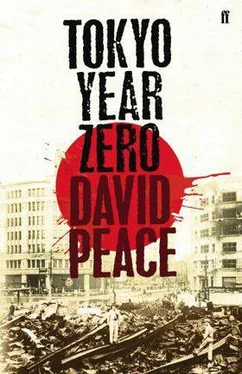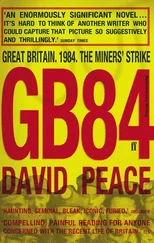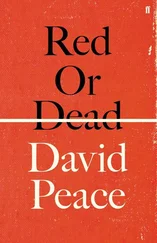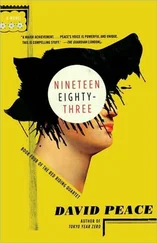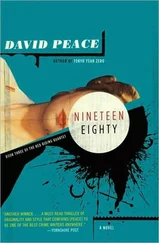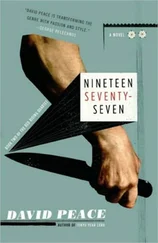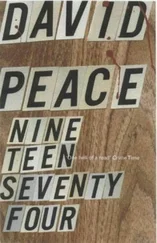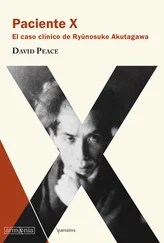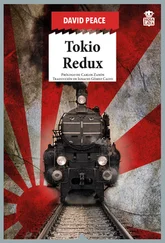David Peace - Tokyo Year Zero
Здесь есть возможность читать онлайн «David Peace - Tokyo Year Zero» весь текст электронной книги совершенно бесплатно (целиком полную версию без сокращений). В некоторых случаях можно слушать аудио, скачать через торрент в формате fb2 и присутствует краткое содержание. Год выпуска: 2007, Издательство: Knopf, Жанр: Современная проза, Детектив, на английском языке. Описание произведения, (предисловие) а так же отзывы посетителей доступны на портале библиотеки ЛибКат.
- Название:Tokyo Year Zero
- Автор:
- Издательство:Knopf
- Жанр:
- Год:2007
- ISBN:нет данных
- Рейтинг книги:3 / 5. Голосов: 1
-
Избранное:Добавить в избранное
- Отзывы:
-
Ваша оценка:
- 60
- 1
- 2
- 3
- 4
- 5
Tokyo Year Zero: краткое содержание, описание и аннотация
Предлагаем к чтению аннотацию, описание, краткое содержание или предисловие (зависит от того, что написал сам автор книги «Tokyo Year Zero»). Если вы не нашли необходимую информацию о книге — напишите в комментариях, мы постараемся отыскать её.
is a darkly lyrical and stunningly original crime novel.
Tokyo Year Zero — читать онлайн бесплатно полную книгу (весь текст) целиком
Ниже представлен текст книги, разбитый по страницам. Система сохранения места последней прочитанной страницы, позволяет с удобством читать онлайн бесплатно книгу «Tokyo Year Zero», без необходимости каждый раз заново искать на чём Вы остановились. Поставьте закладку, и сможете в любой момент перейти на страницу, на которой закончили чтение.
Интервал:
Закладка:
I rush towards them, my arms around them –
I fall to my knees as I bring them close –
‘I thought you were dead,’ I cry –
‘I thought I had lost you…’
But now they push me away, they step back into the shadows as they raise their fingers and point at me –
The rain falling on me now …
‘We’re already dead…’
Now there is no roof and there are no walls, only ashes, no mats and no screens, only ashes, no furniture and no clothes, only ashes, no genkan and no door, only ashes –
Their shoes are cinders …
My right hand trembles, my right arm, now my legs –
For I have no wife, I have no children, only ashes –
Masaki, Banzai! Sonoko, Banzai! …
I have no son and I have no daughter –
Daddy, Banzai! Banzai! …
I have no home. I have no family –
Daddy, Banzai!
I have no heart –
Banzai! …
In this House of Oblivion, I am death.
*
Through the buildings in disrepair and the grounds untended, the gates gone and the trees cut down, they are coming; past the faded paint and the worn linoleum, the stained uniforms and the grubby offices, they are coming; through the sounds of screams and sobs, the smells of DDT and disinfectant, they are coming now –
To the Matsuzawa Hospital for the Insane –
They are coming now. They are coming …
Down these corridors and up these stairs, up these stairs and along another long corridor of locked metal doors, they are coming now; through locked metal doors into the secure wards, into the secure wards and down more corridors, they are coming now; down more corridors to the secure rooms, they are coming now –
They are here! They are here! They are here!
Dr. Nomura before the locked metal door –
Before the bolted metal hatch –
‘Here we are,’ he says.
Nomura slides back the bolts on the hatch. Nomura lowers the metal hatch. Now Nomura steps back and says, ‘There you are…’
I step towards the door. I look through the hatchway –
I stare through the hatchway back into their eyes –
Pairs of brown eyes and pairs of blue …
These men have looked into my eyes before –
My unblinking eyes and my shaven head –
Now I step away from the hatchway –
I sit back cross-legged on my cot –
In my shapeless gown of yellow and dark-blue striped Chinese silk, with my close-shaven head and my unblinking eyes –
The blood-flecked scroll on the wall above my cot –
‘ It is time to reveal the true essence of the nation.’
A colour postcard of the Itsuku-shima Shrine –
My hands folded in my bandaged lap –
I am one of the survivors …
‘Have you seen enough?’ asks Nomura –
The men step away from the hatch –
‘We’ve seen enough,’ says Chief Kita. ‘Thank you, doctor.’
Dr. Nomura closes the hatch. Dr. Nomura bolts it –
The walls are white, but the cell is dark now –
In the half-light, the half-things move –
I close my eyes and I begin to count again; one hundred and twenty Calmotin, one hundred and twenty –
One of the lucky ones .
of every province through which we pass. Dato Nippon Teikokushugi! Trenches dug at six-metre intervals, strewn with hats, leather belts and birdcages. This is not conquest, this is emancipation! The unburied bones of the Chinese dead stand like sticks stuck in the soil. The Light from the East . Brown thighbones shine in the sunlight, vertebrae glisten. Bright Peace . The flies swarm, the air stinks. I lie among the corpses. One hundred and twenty Calmotin, one hundred and twenty-one. The Chinese couple are streaked with dirt, their faces expressionless. The interpreter spits out the match and shouts at the man. The garlic stench, the metallic words. The woman answers the question. The interpreter strikes her. The woman staggers. The interpreter nods. Kasahara and I march the couple to the outskirts of the village, the red sky reflected in the willow-lined creek. The trees are still tonight, the farmhouses abandoned. The couple stare into the waters of the creek, the clusters of wild chrysanthemums, the corpse of a horse, its saddle tangled in weeds. Kasahara draws his sword and I draw mine. The man and the woman drop to their knees. His hands clasped together, her frantic metallic pleas. The blade and then the silence again. Blood flows over their shoulders but neither head falls. The man’s body tilts to the right and topples into the wild chrysanthemums. Masaki, Banzai! I help the woman’s body into the creek, the muddy soles of her feet turned up to the sky. Daddy, Banzai! In the village by the riverbank, lined by willow trees, the group of young able-bodied men poses in front of a half-destroyed house. Our captain in the centre, he rests his hands on the heads of two small children. No tears for the rivers and mountains of their land, no sadness for their father and mother no longer here. I see your little figure, waving a little flag in your little fist . His body among the chrysanthemums, her feet turned up to the sky. Daddy cherishes that picture forever in his mind . By the riverbank, lined by willow trees. In a half-destroyed house, I lie among the corpses. Thousands of them, millions of them. One hundred and thirty Calmotin, one hundred and thirty-one. The sunlight streams in through the windows of the carriage, gaiters hang from the overhead baggage net. A child unsheathes a toy sword. Banzai! One hundred and forty Calmotin, one hundred and forty-one. In the House of Oblivion, there are no flags. Ton-ton . Death is a man from Tochigi. Ton-ton . There are no songs. Death is a man from Tokyo. Ton-ton . Death is a man from Japan. Ton-ton . There are only drums. Death is a man from Korea. Ton-ton . Death is a man from China. Ton-ton . Drums of skin, drums of hair. Death is a man from Russia. Ton-ton . Death is a man from Germany. Ton-ton . Beaten by thighbones. Death is a man from France. Ton-ton . Death is a man from Italy. Ton-ton . Beaten by children. Death is a man from Spain. Ton-ton . Death is a man from Great Britain. Ton-ton . Banging the drum, after we’re gone. Death is a man from America. Ton-ton . There are no exits, in the House of Oblivion. Ton-ton . Death is a man. Ton-ton . Cut off your cock! Masaki, Banzai! Death is a man. Ton-ton . Tear out your heart! Daddy, Banzai! Death is a man. Banzai! One hundred and fifty Calmotin…
Author’s Note
Kodaira Yoshio was executed at the Miyagi Prison in Sendai
Prefecture on the fifth of October, 1949.
He was forty-four years old.
Kodaira Yoshio had confessed to the rapes and murders of ten
women, including Miyazaki Mitsuko and the second woman found
in Shiba Park, Tokyo, in August 1946.
However, this woman has never been identified.
She was aged approximately seventeen to eighteen years and
died on or around the twenty-second of July, 1946 –
Namu-amida-butsu…
David Peace, Tokyo, 2006
The Year of the Dog
Glossary
Throughout the text, I have followed the Japanese convention in which the family name precedes the personal name. Akahata the Red Flag , a daily communist newspaper Asahi Shimbun a daily newspaper Asobu…? Shall we play? ayu a type of fish bakudan the explosion of a bomb; also the name given to low-grade alcohol that had a similar effect on the drinker Banzai! Hurrah! bentō a prepared lunch box butsudan a family or household Buddhist altar upon which photographs of the dead are displayed Calmotin a brand of sleeping pill chiku-taku tick-tock — dōri street Formosans people from the former Japanese colony of Formosa, now Taiwan furoshiki large handkerchief used for wrapping articles fūten group or gang of prostitutes futon a mattress gari-gari the sound of scratching genkan the entrance to a house, inside the front door, used for taking off, putting on and storing shoes geta wooden clogs GHQ General Headquarters (of SCAP) gumi group or gang haramaki a belly band ikidaore an accidental death while on an excursion Jinan Incident also known as the May 3rd Incident in Chinese; the battle between the Japanese army and the Southern Army of the Chinese Kuomintang Nationalist Army in May 1928, when the Japanese army entered Jinan, the capital of Shandong province in China, in order to protect Japanese citizens and businesses kacho the chief of a section kaidashi used to describe scavenging for food or hunting for supplies kakigo ri a flavoured cone of shaved ice Kakyō Sōkai a post-war association of Chinese immigrant businesses Kantō the region of Japan in which Tokyo is situated Katakana a basic written form of Japanese syllabary keisatsu techō a policeman’s notebook and credentials Kempei a Kempeitai officer Kempeitai the Japanese wartime military police kuso an expletive mechiru-arukōru low-grade wood alcohol Meiji the name given to the reign of the former Emperor Mutsuhito, 1866–1912 meishi a business or name card Minpo a daily newspaper Minshū Shimbun a daily newspaper monpe women’s pantaloons Namu-amida-butsu ‘Save us, merciful Buddha’, or ‘May his/her soul rest in peace’ okawari a second-helping pan-pan post-war Japanese prostitutes potsu-potsu drip-drop, drip-drop Public Safety Division the branch of SCAP responsible for the reform of the Japanese police Rikusen Tai Japanese Naval Marine Corps sara-sara in this instance, the sound of running water SCAP Supreme Commander for the Allied Powers SCAPIN SCAP Instruction (i.e. directive) Shinchū Gun the Army of Occupation Shōwa the name given to the reign of the former Emperor Hirohito, 1926–1989 soba buckwheat noodles Taishō the name given to the reign of the former Emperor Yoshihito, 1912–1926 tatami rush-covered straw matting tekiya a stall-holder, but also a racketeer Tōhoku the north-eastern regions of the main Japanese island of Honshu Tokkō the ‘Thought Police’ ton-ton tap-tap; the sound of hammering wā-wā the sound of a baby crying yakitori grilled pieces of chicken on a stick Yobo in this instance, a derogative term for an old man Yomiuri a daily newspaper yukata a light summer kimono zaibatsu a financial clique zanpan a meal made from leftover scraps zā-zā the sound of pelting rain zōsui a porridge of rice and vegetables
Читать дальшеИнтервал:
Закладка:
Похожие книги на «Tokyo Year Zero»
Представляем Вашему вниманию похожие книги на «Tokyo Year Zero» списком для выбора. Мы отобрали схожую по названию и смыслу литературу в надежде предоставить читателям больше вариантов отыскать новые, интересные, ещё непрочитанные произведения.
Обсуждение, отзывы о книге «Tokyo Year Zero» и просто собственные мнения читателей. Оставьте ваши комментарии, напишите, что Вы думаете о произведении, его смысле или главных героях. Укажите что конкретно понравилось, а что нет, и почему Вы так считаете.
